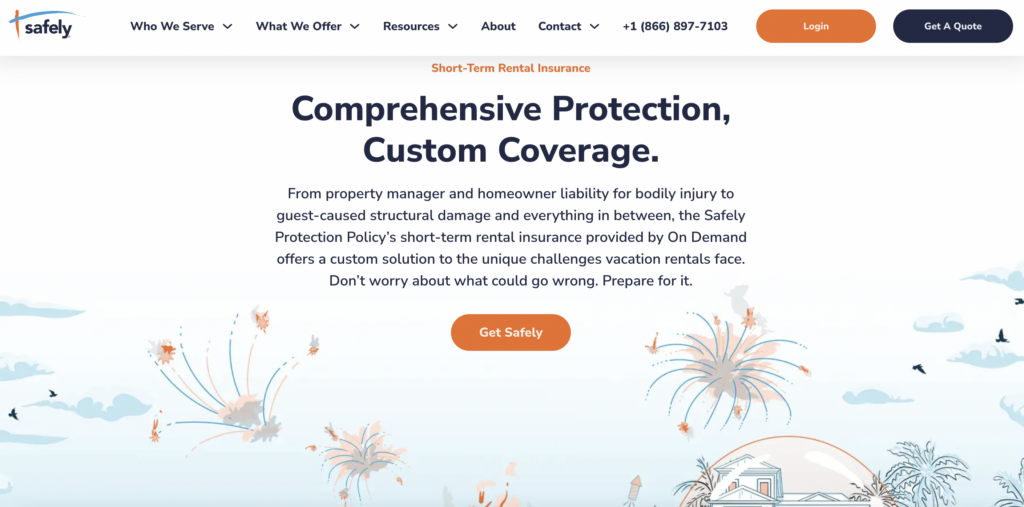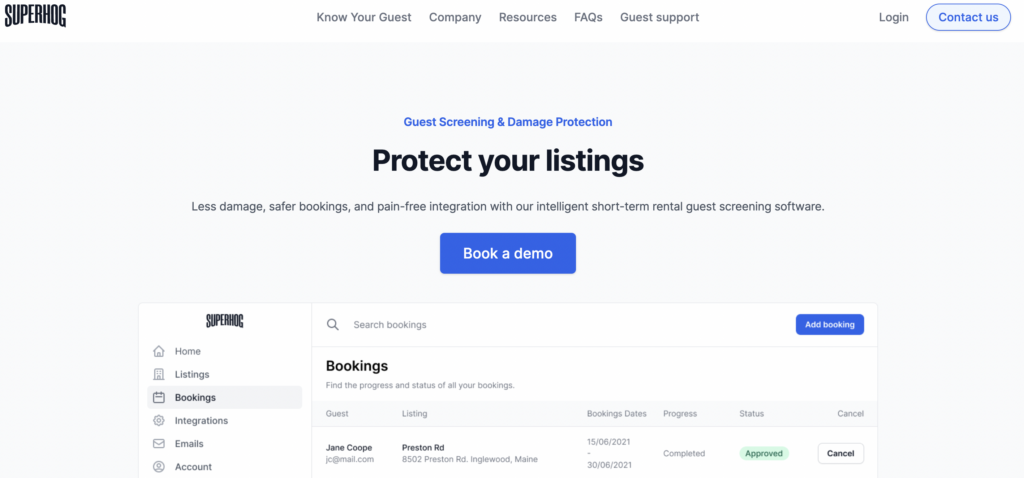In the last 15 or so years, the emergence of Airbnb has revolutionized the travel industry. However, with new short-term rental accommodations, comes new short-term rental insurance needs. Airbnb’s solution: AirCover. How does Airbnb’s AirCover protect both hosts and guests in case of unexpected events? And how does it compare to traditional home insurance?
In this article, we will explore:
- The ins and outs of Airbnb AirCover
- How Airbnb AirCover differs from standard liability insurance policies
- Reasons to consider per-stay vacation rental insurance policies
What is Airbnb AirCover?
AirCover is a free form of host liability insurance that aims to protect both Airbnb hosts and guests in case of property damage or liability claims. It’s designed to provide peace of mind to users of the platform, ensuring that they do not have to bear the financial burden of unexpected incidents.
So how does Airbnb AirCover work? In addition to safely and securely screening and verifying guests prior to bookings, it provides coverage for up to $3 million in property damage and $1 million in liability insurance. This means that if a guest accidentally damages something in the Airbnb host’s property, the insurance will cover the cost of repair or replacement. Similarly, if a guest gets injured during their stay and files a liability claim, it will help cover the associated costs. When guests book a stay through Airbnb, the presence of Airbnb AirCover is indicated on the listing page, engendering confidence in guests and assurance for hosts. It’s a win-win solution.
It’s important to note that AirCover for hosts is not a substitute for homeowners or renters insurance, and is a far cry from a dedicated per-stay vacation rental protection program. Instead, it works as a complementary service, filling in the gaps where traditional insurance policies may fall short.
Hosts and property managers are strongly encouraged to have their own insurance in place, as Airbnb AirCover may not cover certain types of damages or incidents and hosts may find the payouts are slower than dedicated protection programs.
The evolution of Airbnb‘s host protection
Airbnb first launched in 2008, allowing individuals to rent out their homes to travelers. However, as the platform grew in popularity, concerns arose regarding the safety and security of both hosts and guests. In response, Airbnb introduced the Host Guarantee program in 2011.
The Host Guarantee initiative was designed to provide Airbnb hosts with coverage for up to $1 million in property damage caused by guests. The program became a fundamental part of Airbnb’s commitment to building trust within its community, providing hosts with peace of mind, knowing that they would be protected in case of any guest damages or unforeseen accidents.
The company recognized that as Airbnb continued to evolve and expand globally, its’ Host Guarantee program also needed to evolve and expand. In 2015, the company unveiled a more comprehensive host damage protection and liability insurance plan called Airbnb AirCover.
Today, Airbnb AirCover protects hosts from both physical damage to their property and from potential legal claims arising from injuries that occur during a guest’s stay. Additionally, AirCover offers customers 24/7 Airbnb support to assist and guide hosts in navigating any issues that may arise. AirCover has also introduced a host education program with valuable resources to help hosts proactively manage risks and prevent potential incidents.
A closer look at Airbnb AirCover coverage
Once enrolled in AirCover, hosts should direct incidents to the Airbnb resolution center. Let’s delve into AirCover’s various kinds of protection.
Property damage protection
Airbnb AirCover for hosts covers up to $3 million dollars in host damage protection. Reimbursement for necessary repairs or replacements for everything from minor accidental breakage to significant property damage caused by guests ensures financial relief for hosts.
Common host damage protection includes:
Art and valuables
Airbnb restores, replaces or pays for a host’s damaged or stolen art or valuables.
Pet damage
Airbnb covers property damage costs caused by a guest’s pet (think damages made by soiling or scratching).
Deep cleaning
Airbnb reimburses hosts for necessary extra cleaning services (for example, professional carpet deep cleaning fees)
Auto and boat
Hosts need not worry about storing any autos or boats at their property as Airbnb covers damage done to these vehicles during guest stays.
Income loss coverage
Airbnb hosts may experience cancellations or need to invest in repairs, resulting in lost income. To mitigate this risk, Airbnb AirCover offers hosts income loss coverage to support hosts during such unforeseen circumstances.
Liability insurance
Liability insurance is another crucial component of AirCover for hosts. In the unfortunate event of a guest suffering an injury or accident during their stay, this coverage protects up to $1 million in necessary medical expenses and legal costs. This host liability insurance is extraordinarily valuable to protect hosts from suffering from major bills and fees.
Requirements and steps for Airbnb AirCover
Airbnb AirCover is free for its hosts, however, users must meet certain eligibility requirements, for qualification and comply with Airbnb’s terms and conditions. These may include safety standards and local regulations. Failure to adhere to these requirements may result in a loss of coverage.
Steps to Airbnb AirCover enrollment
Enrolling in Airbnb AirCover is a straightforward process. Here are the steps hosts need to follow:
- Log in to your Airbnb account
- Go to the “Host” section of your account
- Click on “Insurance & Protections”
- Review the coverage details and terms
- Confirm your acceptance and understanding of the coverage
- Voila! Enjoy your Airbnb AirCover protection
Limitations and exclusions of Airbnb AirCover
While Airbnb Air Cover offers valuable protection, as with any insurance policy, reading and understanding the fine print is crucial. Familiarize yourself with the terms, conditions, and exclusions to ensure you fully comprehend the provided coverage.
Some basic Airbnb AirCoverexclusions include:
- Costs associated with pet injuries and medical care
- Excessive electricity, gas, fuel, water or other utility usage
- Acts of nature (including hurricanes, tornadoes, and earthquakes)
- Ordinary wear and tear
- Damages caused after an Airbnb guest’s stay
- Damage from faulty construction or due to changes in temperature
- Damage caused by insects, animals or vermin (discluding pets)
- Mold, mildew, fungus, spores, virus, bacterium claims or expenses
Airbnb AirCover vs. Traditional home insurance policies
Airbnb AirCover and traditional home insurance policies share a key similarity yet are notably different, too.
Both Airbnb AirCover and traditional home insurance aim to protect homeowners and their properties from unexpected incidents. They provide coverage for property damage and liability, ensuring financial protection for policyholders.
One significant difference between these insurance policies is the on-demand aspect of Airbnb AirCover. While traditional home insurance offers year-round coverage for homeowners, AirCover only provides coverage during specific rental periods.
Beyond AirCover: Dedicated vacation rental insurance providers
As any Superhost can tell you, while Airbnb AirCover offers substantial protection, it may not be the only option for hosts seeking comprehensive coverage. Depending on the specific needs and location of your vacation rental property, niche insurance providers may offer more affordable options than buying a year-round traditional insurance policy. Here are some dedicated vacation rental insurance providers worth considering—all of which tend to pay out quickly and, depending on your policy, may provide top-to-bottom protection:
Safely
As a trusted short-term rental insurance company, Safely offers hosts coverage for pet damage, intentional acts, theft, bodily injury, or what the company calls “Stupidity” or “Vacation brain.” You can use Safley instead of AirCover: “Our customers love covering all of their reservations with Safely, Inc, including Airbnb! We are the first line of defense against guest damage, ranging from pesky linen stains to catastrophic kitchen fires,” Amanda, a Safely rep explains.
“You have up to 60 days to report your damage, and we never require the guest to admit their destruction,” she continues. “We will contact your guest for bodily injury claims, but otherwise, we leave your guests alone to help prevent bad reviews.” In addition to guest screening and short-term rental travel insurance, Safely also integrates with a range of property management systems, including Hostfully.
Truvi
Truvi is another popular short-term rental protection provider. Touting $5 million in coverage, and thorough guest screenings, Truvi also covers guest damage to belongings, contents, and common areas due to accidental and malicious acts.
Beth from Truvi notes that, “We’re dedicated to ensuring swift reimbursement (we settle damage claims within just 9 days of being reported) and provide unwavering protection for property management businesses.” Truvi seamlessly integrates with a variety of property management systems, screens guests, and unlike Airbnb’s Aircover, Truvi’s “robust damage protection plan extends seamlessly across all booking platforms, even encompassing direct bookings.”

InsuraGuest
InsuraGuest is another vetted vacation rental insurance company boosting coverage to 1,000,000 injured guests. Like other providers, it covers theft, property damage, accidental medical, and even accidental death, however, its policies tend to be lower, maxing out at $25,000 depending on the coverage. Additionally, as an alternative to security deposit fees, InsuraGuest offers a cost-sharing option which, when used, charges guests a percentage of the coverage cost.

Other benefits of short-term vacation rental insurance
In addition to insurance coverage, many dedicated vacation rental insurance policies offer additional services. These include guest screening portals that span Interpol, various watchlists, and their own internal databases or risky guests. In some cases, they also offer security deposit management and even tools to upsell travel insurance to the guest (with an option for adding a commission to earn hosts more).
Automating insurance coverage can simplify the process for hosts and provide peace of mind. Niche vacation rental insurance providers have integrations with platforms like Airbnb. They also have integrations with top-tier property management systems (PMSs) like Hostfully. In both cases, insurance program coverage will automatically be added for every booking made through the platform, reducing the risk of human error or oversight.
Conclusion
Between host damage protection and host liability insurance, Airbnb AirCover provides valuable coverage. However, any free coverage should be expected to have some limitations, and therefore, for comprehensive coverage, our recommendation is to invest in dedicated insurance in addition to AirCover. Whether you choose a traditional insurance policy or a dedicated short-term rental insurance provider, protecting your investment and ensuring a worry-free experience for all parties is paramount.
Frequently Asked Questions
How do I make a claim on Airbnb AirCover?
Within 14 days of check-out, visit the Resolution Centre and file an AirCover for Hosts request. You’ll have to attach photos of the damages, estimates to replace, clean, or rebuild or receipts (if you already corrected the issue).
Does Airbnb AirCover cover theft?
If the theft happened during the guest’s stay, AirCover may reimburse you for it. You will have to go through your home insurance provider for thefts that fall outside the check-in and check-out times.
Do I still need insurance if I have Airbnb AirCover?
You should get an insurance policy that overlaps with Airbnb’s AirCover to protect your assets and liability for when your property isn’t booked. Other reasons to get separate coverage include quicker reimbursements, protection against a wider range of property damage and guest injuries, and income loss protection.







